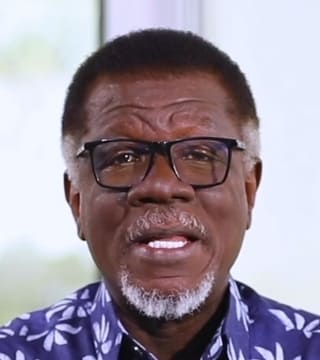Mensa Otabil - A Healing Touch (10/28/2025)
We’ve been looking at John chapter 9, the encounter between Jesus and the blind man. The man is blind from birth. The Disciples of Jesus asked Jesus, «Whose fault is it? Is it the man’s sin or his parents'?» Jesus answered, «Neither of them, but that the works of God will be done.» Now Jesus takes the step to remedy the situation. So, John 9:6 states, «When he had said these things, he spat on the ground and made clay with the saliva, and he anointed the eyes of the man with the clay.» Primarily in the Gospels, Jesus healed people by either speaking a word of healing to them, telling them to be healed, rise up, and walk, or touching them with his hand, laying hands on them. These were the primary ways that Jesus healed people, but on this occasion, Jesus did something unusual, and he used clay to touch the eyes of the man.
So, I want you to pay attention to the three things that stand out from this passage. First is that Jesus made clay, and he made clay with saliva. The big deal is not about the saliva because in the days of Jesus, that is how normally people would make clay. A small piece of clay was made with saliva, so it wasn’t an unusual thing for Jesus to do; it was a normal thing. The important thing is that he made clay. Clay comes from the earth; it’s a natural product. Interestingly, God created man from the same ground, so there is something Jesus is demonstrating about using natural elements as part of the healing process. He’s using natural elements as part of the healing process, so he made the clay, showing that God can sometimes use natural elements in the process of healing.
Secondly, Jesus touched the man’s eyes. Why do I say Jesus touched him? Because the clay didn’t lift itself from the ground to touch the man. Jesus scooped the clay from the ground and used his hand to touch the man’s eyes. So here we see the hand of Jesus and the clay working together. Two things are happening: the natural element and the supernatural-the hand of the Lord Jesus Christ being used to apply the healing. The third thing that we learn is that Jesus then anointed the man’s eyes with the clay. So his hand and the clay anointed the man’s eyes, and that is how he executes the healing process. There are lessons to learn from this, and the lesson is that sometimes when we’re sick, God will use natural elements. Today, we may call them medicine because all medicines come from nature; they come from plants or from the earth, or chemicals or minerals from the earth, processed one way or another. God can use them and anoint them to bring healing to us.
So Jesus is very intentional and deliberate about this: sometimes God can use natural elements, with his hand and his power, to touch us where we are, and we will be healed. The other thing to notice is that Jesus touched the place of the problem. He doesn’t touch his leg or his arm because the man’s arm is not sick and his leg is not sick. What is sick is what he touches, and that’s a clue about how God works. When he’s working to bring wholeness to us, he touches the place where we hurt. Sometimes, when God touches the place where you hurt, you may feel more pain, you may feel discomfort, or you may feel that he is worsening your situation. But if you trust God, he never touches you to hurt you; he touches you to heal you. So he uses natural elements; the hand of Jesus anoints the eye of the man, and tomorrow we are going to find out what happened as a result of this process of using the hand of Jesus and natural elements to touch people.
Let us pray. Say with me, «Heavenly Father, touch my life with your healing hands. I receive the healing anointing in my body. In Jesus' name, amen and amen.»

